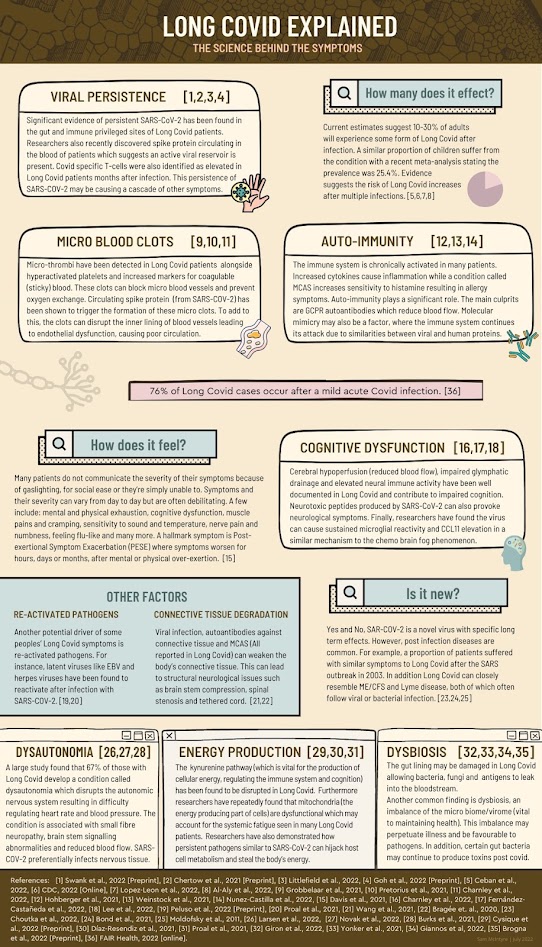Many People with Long COVID Experienced Mild Infection: Study
A global analysis found that around 90 percent of long-COVID cases occur in individuals who were not hospitalized for COVID-19.
In a commentary published in January 2023, the authors of the study concluded that this would suggest that most people with long COVID experienced a mild infection.
The data come from a global study that analyzed 54 studies and two medical databases across 10 countries. The authors defined long COVID as the persistence of fatigue, cognitive, or respiratory symptoms for over three months post-COVID. They found that 89.7 percent (130 million) of the recorded long-COVID cases occurred in people who were not hospitalized for COVID-19.
In reviewing the study, it appears that because mild cases make up the majority of long-COVID cases, having mild COVID might be what puts people at risk of long COVID.
However, the report’s corresponding author, Dr. Theo Vos from the University of Washington, who holds a doctorate in epidemiology and health economics, expressed in an email to The Epoch Times that the more likely explanation is that since most people experience mild symptoms with COVID-19, then if some of these patients were to become long-haulers, they would easily make up the majority of overall long-COVID cases.
Previous studies that tracked the severity of COVID-19 symptoms also supported this reasoning. A study in February 2020 that tracked infections in China showed that asymptomatic and mild disease exceeded 80 percent of all COVID-19 cases.
“The sheer [greater] number of non-hospitalized infections … means that the vast majority of long-COVID cases arise in people with milder acute infection,” Vos wrote in the email.
Predicting the Development of Long COVID
The global study, like much previous research, supports the hypothesis that a severe case of COVID-19 would increase the risk of developing long COVID.
Based on the data analyzed, the authors estimated that a greater proportion of patients who needed critical care or hospitalization for COVID-19 developed long-COVID symptoms than non-hospitalized patients.
However, since most people do not develop severe symptoms during a COVID-19 infection, this may be why physicians do not see clear patterns in the patients who progress to long COVID.
Further, the severity of the initial COVID-19 infection may not predict the severity of long COVID.
The chief of critical care and COVID-19 at the United Memorial Medical Center in Houston, Texas, Dr. Joseph Varon told The Epoch Times that he has seen long-COVID patients with varying severities of the initial COVID-19 infection.
One of his patients developed very dire symptoms of long COVID after experiencing a mild case of COVID-19.
“That’s the primary concern that I have, because a lot of people think that you [need to] have severe disease to have a more [severe case of] long COVID,” Varon said.
Though many studies have suggested that people with underlying health conditions, such as diabetes and obesity, are more at risk for long COVID, doctors have seen a mixed bag of patients reporting severe symptoms.
Critical care pulmonary specialist Dr. Pierre Kory said on EpochTV’s “Frontline Health” that he is actually seeing many patients who are young, healthy, and were professional or aiming to become professional athletes, now being severely debilitated by long COVID.
Studies have suggested that exercises may worsen or accelerate the progression to long COVID. A survey of over 477 long-COVID patients in the UK found that around 75 percent reported worsened symptoms after exercise.
Kory said that there are different types of long-COVID patients. The first type comprises those who directly progress from acute to long COVID. These people never experience a period of recovery before relapsing into long COVID, and they make up a small minority of long-COVID patients. Most long-COVID patients experience a brief period of recovery for a few weeks or a few months before progressing to long COVID.
To prevent long COVID, doctors like Kory and Varon recommend early treatment drugs to inhibit the virus from replicating and causing further damage and symptoms.
Kory and Varon are part of a group of critical care experts within the Front Line COVID-19 Critical Care Alliance. They have developed their own early treatment protocols to help people recover from COVID-19 infection.
Varon said that most of the long-COVID patients in his clinic did not get adequate treatment at the time of infection, observing that when he gave ivermectin, as per his protocol to patients, very few would later progress to long COVID.
If you or a loved one has been affected, the Front Line COVID-19 Critical Care Working Group's (FLCCC) I-RECOVER protocol can give you step-by-step instructions on how to treat reactions from COVID-19 injections.


.png)








Comments